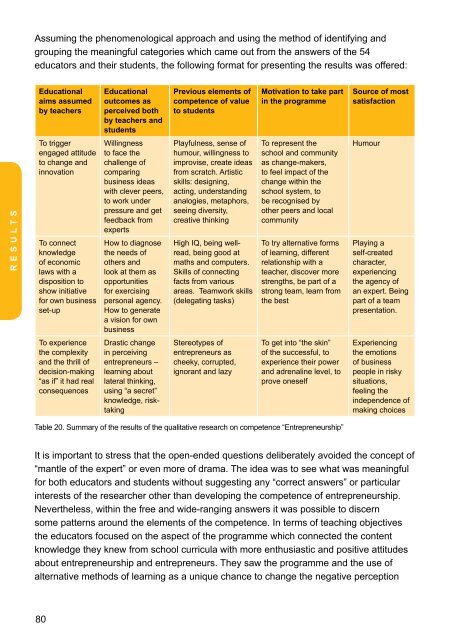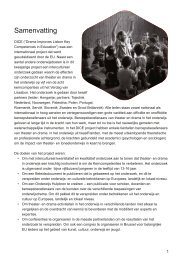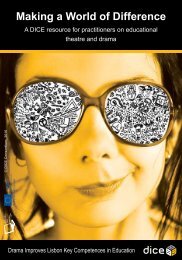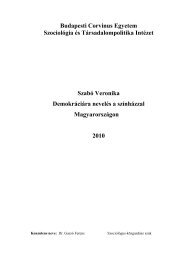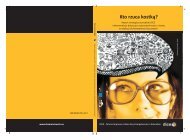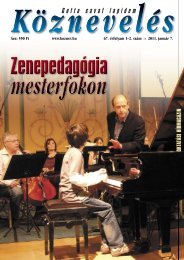Policy Paper - Drama Improves Lisbon Key Competences in Education
Policy Paper - Drama Improves Lisbon Key Competences in Education
Policy Paper - Drama Improves Lisbon Key Competences in Education
Create successful ePaper yourself
Turn your PDF publications into a flip-book with our unique Google optimized e-Paper software.
R e s u l t s<br />
Assum<strong>in</strong>g the phenomenological approach and us<strong>in</strong>g the method of identify<strong>in</strong>g and<br />
group<strong>in</strong>g the mean<strong>in</strong>gful categories which came out from the answers of the 54<br />
educators and their students, the follow<strong>in</strong>g format for present<strong>in</strong>g the results was offered:<br />
<strong>Education</strong>al<br />
aims assumed<br />
by teachers<br />
To trigger<br />
engaged attitude<br />
to change and<br />
<strong>in</strong>novation<br />
To connect<br />
knowledge<br />
of economic<br />
laws with a<br />
disposition to<br />
show <strong>in</strong>itiative<br />
for own bus<strong>in</strong>ess<br />
set-up<br />
To experience<br />
the complexity<br />
and the thrill of<br />
decision-mak<strong>in</strong>g<br />
“as if” it had real<br />
consequences<br />
<strong>Education</strong>al<br />
outcomes as<br />
perceived both<br />
by teachers and<br />
students<br />
Will<strong>in</strong>gness<br />
to face the<br />
challenge of<br />
compar<strong>in</strong>g<br />
bus<strong>in</strong>ess ideas<br />
with clever peers,<br />
to work under<br />
pressure and get<br />
feedback from<br />
experts<br />
How to diagnose<br />
the needs of<br />
others and<br />
look at them as<br />
opportunities<br />
for exercis<strong>in</strong>g<br />
personal agency.<br />
How to generate<br />
a vision for own<br />
bus<strong>in</strong>ess<br />
Drastic change<br />
<strong>in</strong> perceiv<strong>in</strong>g<br />
entrepreneurs –<br />
learn<strong>in</strong>g about<br />
lateral th<strong>in</strong>k<strong>in</strong>g,<br />
us<strong>in</strong>g “a secret”<br />
knowledge, risktak<strong>in</strong>g<br />
Previous elements of<br />
competence of value<br />
to students<br />
Playfulness, sense of<br />
humour, will<strong>in</strong>gness to<br />
improvise, create ideas<br />
from scratch. Artistic<br />
skills: design<strong>in</strong>g,<br />
act<strong>in</strong>g, understand<strong>in</strong>g<br />
analogies, metaphors,<br />
see<strong>in</strong>g diversity,<br />
creative th<strong>in</strong>k<strong>in</strong>g<br />
High IQ, be<strong>in</strong>g wellread,<br />
be<strong>in</strong>g good at<br />
maths and computers.<br />
Skills of connect<strong>in</strong>g<br />
facts from various<br />
areas. Teamwork skills<br />
(delegat<strong>in</strong>g tasks)<br />
Stereotypes of<br />
entrepreneurs as<br />
cheeky, corrupted,<br />
ignorant and lazy<br />
Motivation to take part<br />
<strong>in</strong> the programme<br />
To represent the<br />
school and community<br />
as change-makers,<br />
to feel impact of the<br />
change with<strong>in</strong> the<br />
school system, to<br />
be recognised by<br />
other peers and local<br />
community<br />
To try alternative forms<br />
of learn<strong>in</strong>g, different<br />
relationship with a<br />
teacher, discover more<br />
strengths, be part of a<br />
strong team, learn from<br />
the best<br />
To get <strong>in</strong>to “the sk<strong>in</strong>”<br />
of the successful, to<br />
experience their power<br />
and adrenal<strong>in</strong>e level, to<br />
prove oneself<br />
Table 20. Summary of the results of the qualitative research on competence “Entrepreneurship”<br />
Source of most<br />
satisfaction<br />
Humour<br />
Play<strong>in</strong>g a<br />
self-created<br />
character,<br />
experienc<strong>in</strong>g<br />
the agency of<br />
an expert. Be<strong>in</strong>g<br />
part of a team<br />
presentation.<br />
Experienc<strong>in</strong>g<br />
the emotions<br />
of bus<strong>in</strong>ess<br />
people <strong>in</strong> risky<br />
situations,<br />
feel<strong>in</strong>g the<br />
<strong>in</strong>dependence of<br />
mak<strong>in</strong>g choices<br />
It is important to stress that the open-ended questions deliberately avoided the concept of<br />
“mantle of the expert” or even more of drama. The idea was to see what was mean<strong>in</strong>gful<br />
for both educators and students without suggest<strong>in</strong>g any “correct answers” or particular<br />
<strong>in</strong>terests of the researcher other than develop<strong>in</strong>g the competence of entrepreneurship.<br />
Nevertheless, with<strong>in</strong> the free and wide-rang<strong>in</strong>g answers it was possible to discern<br />
some patterns around the elements of the competence. In terms of teach<strong>in</strong>g objectives<br />
the educators focused on the aspect of the programme which connected the content<br />
knowledge they knew from school curricula with more enthusiastic and positive attitudes<br />
about entrepreneurship and entrepreneurs. They saw the programme and the use of<br />
alternative methods of learn<strong>in</strong>g as a unique chance to change the negative perception<br />
of the bus<strong>in</strong>ess sector <strong>in</strong> Poland which prevents teenagers from show<strong>in</strong>g <strong>in</strong>terest <strong>in</strong><br />
entrepreneurship education. The educators became open enough to give up the old<br />
methods of lectur<strong>in</strong>g on the subject and worked hard on promot<strong>in</strong>g students’ engagement<br />
<strong>in</strong> the process of exploration and discovery of more personal mean<strong>in</strong>gs. Most successful<br />
coaches reported becom<strong>in</strong>g expert <strong>in</strong> us<strong>in</strong>g the spontaneity of teenagers and their<br />
fasc<strong>in</strong>ation with novelty and surprise. They learnt along with the students that tak<strong>in</strong>g<br />
on the perspective of an expert <strong>in</strong> the context of the tournament were not just an act of<br />
imag<strong>in</strong>ation and playfulness but a serious challenge. Some educators were surprised at<br />
how quickly the young people gave up their role of an ignorant student who is helpless<br />
without an adult <strong>in</strong>structor say<strong>in</strong>g exactly what, how and when they should learn.<br />
“<br />
I was sceptical – the tasks were too complicated and [there was] too little time.<br />
The role th<strong>in</strong>g seemed too childish for the content. But my students signalled<br />
to me that they already have some experience, perhaps even stronger than<br />
m<strong>in</strong>e, <strong>in</strong> solv<strong>in</strong>g “real life” problems. I th<strong>in</strong>k they figured out immediately that<br />
entrepreneurship is about action and simply try<strong>in</strong>g out th<strong>in</strong>gs, it needs wide open<br />
eyes, commitment and full engagement <strong>in</strong> what you are work<strong>in</strong>g on. It is exactly<br />
for them as they have just a little knowledge but are impatient to be famous for<br />
<strong>in</strong>vent<strong>in</strong>g someth<strong>in</strong>g and sell<strong>in</strong>g it to the world. It was just enough for me to see<br />
them hooked on the problems and aware of other teens play<strong>in</strong>g expert games –<br />
the rest was a matter of tim<strong>in</strong>g their work. 61<br />
Both students and educators valued the new attitude of openness to challenge and<br />
feedback from real experts as the key element of the competence they were learn<strong>in</strong>g.<br />
They appreciated competition from peers that could match or even outgrow their own<br />
knowledge and skills. They found it useful for their development as they identified<br />
their imag<strong>in</strong>ation, creativity and will<strong>in</strong>gness to improvise a solution based on new<br />
arrangements of facts; and they found it more mean<strong>in</strong>gful than school-tested knowledge.<br />
They saw the benefit of creat<strong>in</strong>g, rather than just present<strong>in</strong>g. They reported that the<br />
best ideas sometimes came from playfulness, <strong>in</strong>spir<strong>in</strong>g each other with jokes, absurd<br />
characters, and silly analogies, distanc<strong>in</strong>g or ridicul<strong>in</strong>g the subject, and sudden changes<br />
of perspective.<br />
“<br />
I did not th<strong>in</strong>k it was useful to laugh so much dur<strong>in</strong>g all these games the<br />
organisers recommended. It just did not seem to make sense time-wise. When<br />
they were stuck with ideas for a bus<strong>in</strong>ess I let them improvise with some simple<br />
classroom objects. They used to do this <strong>in</strong> their theatre workshops last year. It<br />
was just a second and they produced too many ideas to remember them all… My<br />
job was to ask some questions about what people would be will<strong>in</strong>g to buy and<br />
how it should be tested… 62<br />
61 Teacher <strong>in</strong> report no. 6.<br />
62 Teacher <strong>in</strong> report 49 – her team came second and won the special audience prize.<br />
R e s u l t s<br />
80<br />
81


